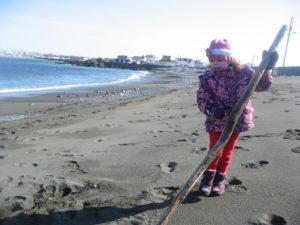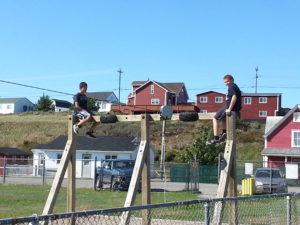My wife had just returned from Switzerland where she spent the better part of the summer with our 2 young children. I was working on the mainland while they were away so when we reunited all hands were anxious to get to Bonavista to spend some time in our beautiful seaside cottage (www.marbellacottage.com) , visit the grandparents, and reconnect with our many friends and neighbours.

“… anxious to get o Bonavista…”
On our first morning we awoke to a spectacular sunrise and the promise of a wonderful summer day. Following a lovely salt fish breakfast and a comb over Long Beach, the girls decided to head up to the park in Port Union. My wife is originally from Bonavista so she knows the best places to entertain children and by the time she made it to the pond a crowd of her friends had already gathered with their children.

“… comb over Long Beach…”
Settling in along the pond side, my wife watched as our daughter cocked her head in observation of the local children who were frolicking in the water. Midst all the cheers and delightful squeals was the rapid fire chatter that is frequently associated with Newfoundland’s many dialects. Somewhat confused by the situation and with her recent exposure to so many foreign tongues in Switzerland, my precocious little, soon to be 3yr old stated:
“Mommy they’re not speaking French – But it’s not English either!”

“… they’re not speaking English…”
Ah, from the mouths of babes – my little townie daughter. Yes, my darling, that is indeed English, albeit a very ancient form of ‘Early Modern English’ that undoubtedly beckons from a Shakespearean era. Here in Bonavista you will find lots of “Yee’s” and “Thee’s”, “Youse” and “they’s”. The syntax is often reversed, and with a little imagination you may find yourself reflecting on the many hours spent studying ‘Romeo and Juliet’, ‘MacBeth’ and ‘Hamlet’.
In all our years of history, Newfoundland has only experienced a single mass migration, when 30,000 Irish citizens (all hailing from the city of Waterford and a 9 mile radius) made the move to Newfoundland between the years of 1762 and 1830. Since that time, Newfoundland has remained in near perfect isolation from the rest of the world. With little influence from the outside – the language you’ll experience often represents an era from many generations past. A “phonological” time capsule you might say.
Make no wonder Newfoundland’s Memorial University is so well known for its linguistics studies as students flock to the island to study Irish and English dialects which are better preserved than those found anywhere in the U.K.
While traveling in Newfoundland you too will have the opportunity to experience many hundreds of dialects. Each of which is unique to a particular community and often times discernible within the borders of a single town. So while you’re here, lend an ear – you’ll be amazed at what you hear when you know what to listen for.
“Come here till I tells ya,,,,”

“… come here till I tells ya!”


lovely blog.. never realized about the Irish migration..no wonder it permeates the lingo..
thanks for sharing
Claire